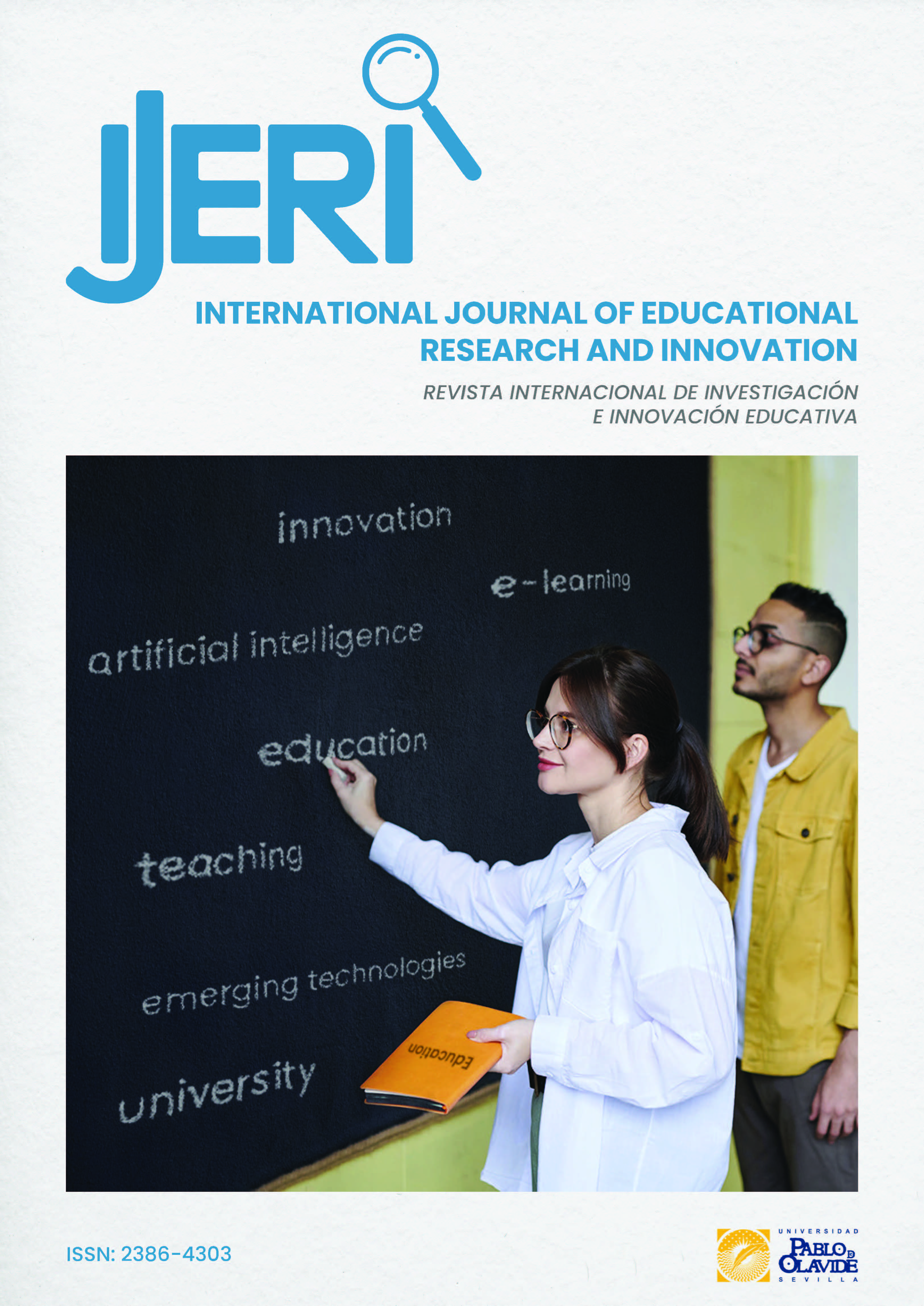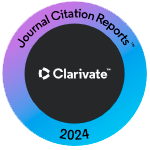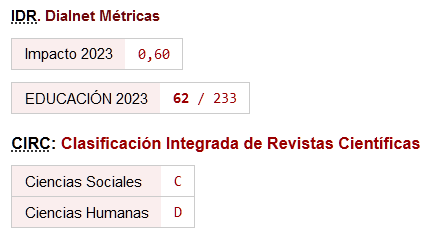Explorando la intersección entre tecnologías IA y alfabetización mediática en personas de edad avanzada
Una revisión sistemática de investigaciones
DOI:
https://doi.org/10.46661/ijeri.11320Palabras clave:
Inteligencia artificial, personas mayores, alfabetización mediática, investigaciónResumen
Este trabajo plantea una revisión sistemática de investigaciones relacionadas con la aplicación de la inteligencia artificial (IA) en personas mayores dentro de contextos educativos y comunicativos. Siguiendo las directrices del protocolo PRISMA 2020, se analizaron 15 estudios seleccionados en las bases de datos de alto impacto académico WoS, Scopus, EBSCO, ERIC y Dialnet Plus, publicados entre 2015 y 2024. Los hallazgos evidencian la limitada producción científica en el ámbito de la educomunicación relacionada con IA y personas mayores, lo que pone de manifiesto la necesidad de ampliar la investigación en este campo. Entre las oportunidades futuras se encuentran el diseño de aplicaciones adaptativas de inteligencia artificial, programas específicos de alfabetización mediática y el desarrollo de agentes conversacionales que optimicen las estrategias de intervención educativa con personas de edad. No obstante, la persistencia de la brecha digital y la discriminación por edad dificultan una integración efectiva de la IA.
Descargas
Citas
Ali, R., Hoque, E., Duberstein, P., Schubert, L., Razavi, S. Z., Kane, B., Silva, C., Daks, J. S., Huang, M., & Van Orden, K. (2021). Aging and Engaging: A pilot randomized controlled trial of an online conversational skills coach for older adults. American Journal of Geriatric Psychiatry, 29(8), 804-815. https://doi.org/10.1016/j.jagp.2020.11.004
Alves, D. L. de L., Esprendor, A., Rodrigues, A. C. R. da L., Eccel, Á. S., Nunes, D. P. de L. M., & Malta, D. P. de L. (2024). Impacto da inteligência artificial na educação inclusiva. Revista Ilustração. https://doi.org/10.46550/ilustracao.v5i7.346
Alzyoudi, M., & Al Mazroui, K. (2024). ChatGPT as a coping mechanism for social isolation: An analysis of user experiences and perceptions of social support. Online Journal of Communication and Media Technologies, 14(3), e202433. https://doi.org/10.30935/ojcmt/14617
Bogoslov, I. A., Corman, S., & Lungu, A. E. (2024) Perspectives on Artificial Intelligence Adoption for European Union Elderly in the Context of Digital Skills Development. Sustainability, 16(11):4579. https://doi.org/10.3390/su16114579
Boot, W. (2022). Artificial intelligence and robotic approaches to supporting older adults. Innovation in Aging, 6(Supplement_1), 70. https://doi.org/10.1093/geroni/igac059.278
Chiappe, A., Amado, N., & Leguizamón, L. (2020). Educommunication in digital environments: An interaction's perspective inside and beyond the classroom. Innoeduca, 6(1), 45–60. https://doi.org/10.24310/INNOEDUCA.2020.V6I1.4959
Choudrie, J., Banerjee, S., Kotecha, K., Walambe, R., Karende, H., & Ameta, J. (2021). Machine learning techniques and older adults processing of online information and misinformation: A COVID-19 study. Computers in Human Behavior, 119, 106716. https://doi.org/10.1016/j.chb.2021.106716
Chu, C. H., Leslie, K., Shi, J., Nyrup, R., Bianchi, A., Khan, S., Rahimi, S., Lyn, A., & Grenier, A. (2022). Ageism and artificial intelligence: Protocol for a scoping review. JMIR Research Protocols, 11(6), e33211. https://doi.org/10.2196/33211
Chu, C. H., Nyrup, R., Leslie, K., Shi, J., Bianchi, A., Lyn, A., McNicholl, M., Khan, S., Abbasgholizadeh, S., Rahimi, S., & Grenier, A. (2022). Digital ageism: Challenges and opportunities in artificial intelligence for older adults. The Gerontologist, 62(7), 947–955. https://doi.org/10.1093/geront/gnab167
Codina, L. (2020a). Revisiones sistematizadas en ciencias humanas y sociales. 3: Análisis y síntesis de la información cualitativa. En C. Lopezosa, J. Díaz-Noci & L. Codina (Eds.), Anuario de métodos de investigación en comunicación social (n.° 1, pp. 73-87). DigiDoc-Universitat Pompeu Fabra. https://doi.org/10.31009/methodos.2020.i01.07
Codina, L. (2020b). Revisiones sistematizadas en ciencias humanas y sociales. Segunda parte: Búsqueda y evaluación. En C. Lopezosa, J. Díaz-Noci & L. Codina (Eds.), Anuario de métodos de investigación en comunicación social (n.° 1, pp. 61-72). DigiDoc-Universitat Pompeu Fabra. https://doi.org/10.31009/methodos.2020.i01.06
de Arriba-Pérez, F., García-Méndez, S., González-Castaño, F. J., & Costa-Montenegro, E. (2021). Evaluation of Abstraction Capabilities and Detection of Discomfort with a Newscaster Chatbot for Entertaining Elderly Users. Sensors. 21(16):5515. https://doi.org/10.3390/s21165515
Dosovitsky, G., & Bunge, E. L. (2021). Bonding With Bot: User Feedback on a Chatbot for Social Isolation. Digit. Health, 3:735053. doi: 10.3389/fdgth.2021.735053
El Kamali, M., Angelini, L., Lalanne, D., Abou Khaled, O., & Mugellini, E. (2023) Older adults' perspectives on multimodal interaction with a conversational virtual coach. Comput. Sci, 5:1125895. https://doi.org/10.3389/fcomp.2023.1125895
Flores-Vivar, J., & García-Peñalvo, F. (2023). Reflections on the ethics, potential, and challenges of artificial intelligence in the framework of quality education (SDG4). Comunicar, 74, 37-47. https://doi.org/10.3916/C74-2023-03
García-Méndez, S., de Arriba-Pérez, F., González-Castaño, F. J., Regueiro-Janeiro, J. A., & Gil-Castiñeira, F. (2021). Entertainment Chatbot for the Digital Inclusion of Elderly People Without Abstraction Capabilities, IEEE Access, 9, 75878-75891. https://doi.org/10.1109/ACCESS.2021.3080837
Gudala, M., Ross, MET., Mogalla, S., Lyons, M., Ramaswamy, P., & Roberts, K. (2022). Benefits of, Barriers to, and Needs for an Artificial Intelligence–Powered Medication Information Voice Chatbot for Older Adults: Interview Study With Geriatrics Experts, JMIR Aging, 5(2):e32169. https://doi.org/10.2196/32169
Khalili-Mahani, N., & Sawchuk, K. (2022). Double-bind of recruitment of older adults into studies of successful aging via assistive information and communication technologies: Mapping review. JMIR Aging. https://doi.org/10.2196/43564
Kitchenham, B., & Charters, S. (2007). Guidelines for performing systematic literature reviews in software engineering (EBSE Technical Report EBSE-2007-01). Keele University and Durham University.
Leong, K., Sung, A., & Jones, L. (2023). The core technology behind and beyond ChatGPT: A comprehensive review of language models in educational research . IJERI: International Journal of Educational Research and Innovation, (20), 1–21. https://doi.org/10.46661/ijeri.8449
Lin, W., Chen, H-C., & Yueh, H-P. (2021). Using Different Error Handling Strategies to Facilitate Older Users’ Interaction With Chatbots in Learning Information and Communication Technologies. Psychol, 12:785815. https://doi.org/10.3389/fpsyg.2021.785815
Martínez-Roig, R. (2024). Social robots, music, and movement: Older people's perceptions of the Pepper training robot. Pixel-Bit: Revista de Medios y Educación, 70, 1-31. https://doi.org/10.12795/pixelbit.104621
Mcdonald, S., & Moher, D. (2021). Declaración PRISMA 2020: Una guía actualizada para la publicación de revisiones sistemáticas. Revista Española De Cardiología, 74(1), 790–799. https://doi.org/10.1136/bmj.n71
Miran, L., Dinh Tuan, T., & Joo-Ho, L. (2021). 3D Facial Pain Expression for a Care Training Assistant Robot in an Elderly Care Education Environment. Frontiers in Robotics and AI, 8. https://doi.org/10.3389/frobt.2021.632015
Moral-Sánchez, S. N., Ruiz Rey, F. J., & Cebrián-de-la-Serna, M. (2023). Analysis of artificial intelligence chatbots and satisfaction for learning in mathematics education. IJERI: International Journal of Educational Research and Innovation, (20), 1–14. https://doi.org/10.46661/ijeri.8196
Munteanu, C., Sarcar, S., Sin, J., Wei, C. Z., Sayago, S., Zhao, W., & Waycott, J. (2024). Designing age-inclusive interfaces: Emerging mobile, conversational, and generative AI to support interactions across the life span. MobileHCI '24 Adjunct: Adjunct Proceedings of the 26th International Conference on Mobile Human-Computer Interaction, 32, 1–5. https://doi.org/10.1145/3640471.3680460
Osuna-Acedo, S., Frau-Meigs, D., & Marta-Lazo, C. (2018). Educación mediática y formación del profesorado. Revista Interuniversitaria de Formación del Profesorado, 31(3), 35–49.
Page, M. J., Mckenzie, J. E., Bossuyt, P. M., Boutron, I., Hoffmann, T. C., Mulrow, C. D., Shamseer, L., Tetzlaff, J. M., Akl, E. A., Brennan, S. E., Chou, R., Glanville, J., Grimshaw, J. M., Hróbjarts son, A., Lalu, M. M., Li, T., Loder, E. W., Mayo-Wilson, E., Mcdonald, S., & Moher, D. (2021). Declaración PRISMA 2020: Una guía actualizada para la publicación de revisiones sistemáticas. Revista Española De Cardiología, 74(1), 790–799. https://doi.org/10.1136/bmj.n71
Sánchez-Serrano, S., Pedraza-Navarro, I., & Donoso-González, M. (2022). ¿Cómo hacer una revisión sistemática siguiendo el protocolo PRISMA? Usos y estrategias fundamentales para su aplicación en el ámbito educativo a través de un caso práctico. Bordón: Revista de Pedagogía, 74(3), 51-66. https://doi.org/10.13042/Bordon.2022.8583045
Santos, M. do S. P. dos, & Ferreira, J. da C. (2024). Transformação educacional: Investigando os impactos da inteligência artificial na pedagogia e aprendizado. Revista Contemporânea, 4(5), e4294. https://doi.org/10.56083/RCV4N5-072
Seol, J. (2024). An exploratory study on digital information education for active seniors: Focusing on those with digital media production training experience. 노년교육연구, 10(1), 38. https://doi.org/10.31748/kseg.2024.10.1.38
Shandilya, E., & Fan, M. (2022). Understanding older adults’ perceptions and challenges in using AI-enabled everyday technologies. Proceedings of the ACM on Human-Computer Interaction, 6(CSCW2), 1–18. https://doi.org/10.1145/3565698.3565774
Sriwisathiyakun, K., & Dhamanitayakul, C. (2022). Enhancing digital literacy with an intelligent conversational agent for senior citizens in Thailand. Educ Inf Technol. 27, 6251–6271. https://doi.org/10.1007/s10639-021-10862-z
United Nations. (2020). World population ageing 2020 highlights: Living arrangements of older persons. Department of Economic and Social Affairs, Population Division. https://www.un.org/development/desa/pd/news/world-population-ageing-2020-highlights
Van Kolfschooten, H. (2023). The AI cycle of health inequity and digital ageism: Mitigating biases through the EU regulatory framework on medical devices. Journal of Law and the Biosciences, 10(2), lsad031. https://doi.org/10.1093/jlb/lsad031
Vasudevan, V., Mohan, U., & Mohan, S. (2024). AI-powered Internet of Medical Things for monitoring elderly adults in independent living environments. In S. Pradhan & M. N. Ghosh (Eds.), Artificial Intelligence in Medicine (pp. 295–313). CRC Press. https://doi.org/10.1201/9781032698519-21
Velázquez-Díaz, D., Arco, J., Ortiz, A., Pérez-Cabezas, V., Lucena-Antón, D., Moral-Muñoz, J., & Galán-Mercant, A. (2023). Use of artificial intelligence in the identification and diagnosis of frailty syndrome in older adults: Scoping review. Journal of Medical Internet Research, 25, e47346. https://doi.org/10.2196/47346
Wang, X., Liang, T., Li, J., Roy, S., Pandey, V., Du, Y., & Kong, J. (2021). Artificial Intelligence-Empowered Chatbot for Effective COVID-19 Information Delivery to Older Adults. International Journal of E-Health and Medical Communications (IJEHMC), 12(6), 1-18. http://doi.org/10.4018/IJEHMC.293285
Xiao, L. (2024). Research on Practical Innovation of Elderly Education Service System in the Era of Artificial Intelligence. Applied Mathematics and Nonlinear Sciences, 9(1). https://doi.org/10.2478/amns-2024-2071
Yang, H., & Chun, B. K. (2024). Experience of the elderly participating in digital use education. Korean Association for Computing Machinery. https://doi.org/10.38019/kacm.15.1.307
Descargas
Publicado
Cómo citar
Número
Sección
Licencia
Derechos de autor 2025 Francisco Marcos Martín-Martín, Ignacio Aguaded Gómez

Esta obra está bajo una licencia internacional Creative Commons Atribución-NoComercial-SinDerivadas 4.0.











